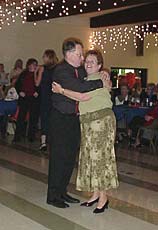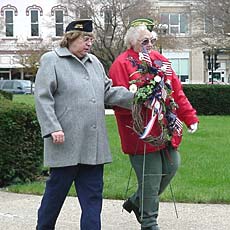|
Nearly 150 veterans from all branches
of service filled the Lincoln Park District ballroom Sunday evening.
They came for a dance and musical tribute honoring them. The evening
was filled with laughter, fast feet and jazzy tunes. All Logan
County veterans were sent invitations to the first-time special
event hosted by the St. John United Church of Christ Youth Group.

[Photo by Jan Youngquist]
Two high school girls, Heather Goetsch
of Williamsville and Michelle Johnson of Latham, co-chaired the
event. The youth group has been working on it since last February,
when it was decided to do it. They worked all year raising funds
through car washes, bake sales and by other means.

Invitations were sent out; the hall was
decorated with white lights. Tablecloths and tableware sported
patriotic colors. Flowers and candies adorned the tables. Young men
in their ancestors’ uniforms and young ladies in long dresses
welcomed guests and served sandwiches, a wide assortment of cakes
and drinks for refreshment.
[to top of second column in
this article]
|

The fabulous Williamsville High School
Jazz Band provided a variety of music but was exceptional in their
lively big band tunes. Goetsch also plays the trumpet in the band.
The atmosphere was sophisticated, yet
relaxed and fun. Veterans and their guests waltzed and jitterbugged
the night away. Lots of smiles and laughter proved the night to be
worth all the youths’ efforts to honor this group of local heroes.
The Lincoln High School Band opened the
traditional ceremony on the Logan County Courthouse lawn Monday
morning. Participants and a crowd gathered in spite of the deep
chill of the 40 degree, overcast morning.

[Photo by Bob Frank]
The Rev. Robert Henderson of the First
Baptist Church provided the invocation and benediction. Along with a
presentation of the colors by the color guard, the firing squad gave
a 21-gun salute, and taps was played Randy and Noah Schrader. A
wreath was laid at the soldiers’ monument.

[Photo by Bob Frank]
[Jan
Youngquist]
|
|
The young husband, wed for a year and a
half, had 13 days to think about leaving. He and his wife broke
household, taking their possessions to various family homes for
storage until their hoped-for return.

[Photo by Jan Youngquist]
[Mildred and Wilbur Wilmert enjoy the sounds
of the Williamsville jazz band.]
Wilmert left Lincoln on Jan. 13, and on
Jan. 20, when it was 13 degrees below zero, he left Peoria. He was
to serve in the 103 Infantry Division of the U.S. Army.
His initial training at Camp Stewart,
Ga., the U.S. Army’s Anti-Aircraft Artillery Training Center, set
the structure for his military service. He would be in a unit that
ran tank guns behind weapons.
Wilmert experienced his first
life-threatening event while still on home ground. One evening the
Wilmerts were returning from an evening out on the town in Glaxton,
Miss., home of fruitcakes. There had been a terrible storm. As
Wilbur exited the car, a snapped power line about 20 feet away met
him with 20,000 volts of electricity. "It wouldn’t let me go," he
says. Some nearby servicemen were able to knock him free from its
grip. His legs hurt after that.

While at Camp Stewart he requested
pilot training and was transferred from Georgia to Miami, Fla., and
then to Greenwood, Miss. That training was disrupted for some
last-moment additional artillery training at Camphouse, Gainesville,
Texas, before he was shipped overseas.
His wife became roommates with another
young woman from Wisconsin who shared the same name as she, Mildred
Marie. The Mildreds shared the same birth date, only one year
different in age. And then, coincidentally, on the same day in
September ’43, both girls had husbands go off to fight the war in
Europe. Their husbands left the United States from the same New York
harbor but went in different directions on different ships.
The ship carrying Wilmert zigzagged
across the ocean for 15 days. After landing in Europe, the 103rd
traveled from Marseille, France, northward. The anti-tank platoon
unit had three squads. Each squad was composed of 10 men, a platoon
leader and a sergeant. Foot soldiers preceded them as they moved
forward. Then the 103rd would bring in the tanks.
Their weapons driver was an Indian from
western Wisconsin named Thunder Cloud. The unit really liked him.
Wilmert remembers that he and Thunder Cloud spent one night sharing
the same foxhole.

One day in October they were caught
within range of German artillery. Wilmert paused, staring somewhere
far off. You could see him thinking back in time, "Pow, pow, pow,
pow, pow; ka boom, ka boom," he said. "I could hear the shots and
explosions," all close by.
An explosion took the lives of several
men in back of him. The man next to him was seriously wounded by
shrapnel and taken to the hospital. He never knew for certain what
became of him. Shrapnel was flying everywhere, he says. Then, he
motions to a place just below his ribs that still confuses medical
professionals when they first see his X-rays. Another day his life
was spared, though not unscathed.
Christmas ’44 came while he was in
Germany.
One of the great moments for the 103rd
was the battle at the Belgian town of Bastogne. The 101st Airborne
Division paratroopers had landed in the German-held territory,
bringing medical supplies and ammunition. They had gotten trapped
there. The 103rd entered and took up position, relieving the 101st,
which had gotten pinned in.

[to top of second column in
this article]
|

It was during the push to hook up with
the Russians that Wilmert had his next near-death experience. They
were at a roadblock and engineers were supposed to meet them to get
them through. The engineers didn’t show. The commander sent Wilmert
to the other side first. He crawled over it to stand guard. The next
guy who followed him was blown up by the booby-trapped gate. The
tough part was getting back to his unit. The whole thing, he
estimates, took about 30 minutes. When he got back, the unit went
and hid nearby. The engineers finally arrived the next day.
Spring opened up, and they made a push.
At Easter he received increased
motivation to stay alive. He received a telegram saying he had a
son. His first child, Jim, was born Good Friday.
Shortly after that, Wilmert’s service
was interrupted by poor health. He came down with hepatitis or
yellow jaundice at Heidelburg, Germany, and was sent to a hospital
in France to recover. While he was there he lost track of his unit.
Many of the high-point men were sent home.
So, when he returned to duty he was not
reassigned to his unit. He became a floater, going from unit to unit
where needed, including time in Nuremberg. The battle in Europe was
coming to a close.
April 16, 1945 —
Soviet troops begin their final attack
on Berlin; Americans enter Nuremberg.
May 7, 1945 —
Unconditional surrender of all German forces to Allies.
May 8, 1945 —
V-E
(Victory in Europe) Day.
He remembers being in Englestad,
Germany, when the H-bomb was dropped on Hiroshima on Aug. 6, 1945.
He finished his service doing guard
duty at a seaport in Belgium. He left South Hampton, England, on the
aircraft carrier the USS Enterprise.

A large storm at sea caused other sea
vessels to turn back, but the Enterprise pushed on. Wilmert was on
the top of bunks stacked three high. He could hear water pouring in
and nonstop sloshing. "It was 10 days of misery," he said. The ship
reverberated with long shudders every time a wave struck. He had
seasickness the whole way. When they arrived at New York they found
no light poles left on the deck. It had been swept clean. A hole the
size of a jeep was torn in the hull.
On Christmas Eve 1945 he and his
comrades enjoyed a steak dinner with all the trimmings at Camp
Kilmore, N.J. New Year’s Day, 1946, two years from the day he stood
in the post office holding his own draft notice, Wilmert arrived
safely back home.
Today, Wilbur and Mildred have raised
two children and still reside in Lincoln. Son, Dr. Jim Wilmert, is a
local orthodontist, and daughter, Kaye Wilmert, is a nurse
anesthetist.
Their son served five years in the
military, achieving the rank of lieutenant colonel. A granddaughter
is awaiting possible military orders to go to Iraq.
Not a trite man and able to see all the
gifts he’s been given in life, Wilmert wonders what it is that he is
still here to say or do for others. He couldn’t be reached for an
interview several days this last week, as he was over helping his
son with some broken plumbing.

In telling
it, Wilmert says he doesn’t have much of a story. But on this day he
has a story that represents all those that we want to honor for
their time and willingness to serve our country. Whether they were
involved in heroic acts or not, their selflessness shown in
willingness to protect our nation is what gives this country our
strength. We would not be the greatest country on earth without
them. We thank all those that have served in the armed forces of the
United States.
[Jan
Youngquist]
A timeline of World War II can be found
at
http://www.historyplace.com/worldwar2/
timeline/ww2time.htm#bulge.
The battle
of Bastogne is documented with pictures at
http://www.historyplace.com/
worldwar2/timeline/bastogne.htm. |